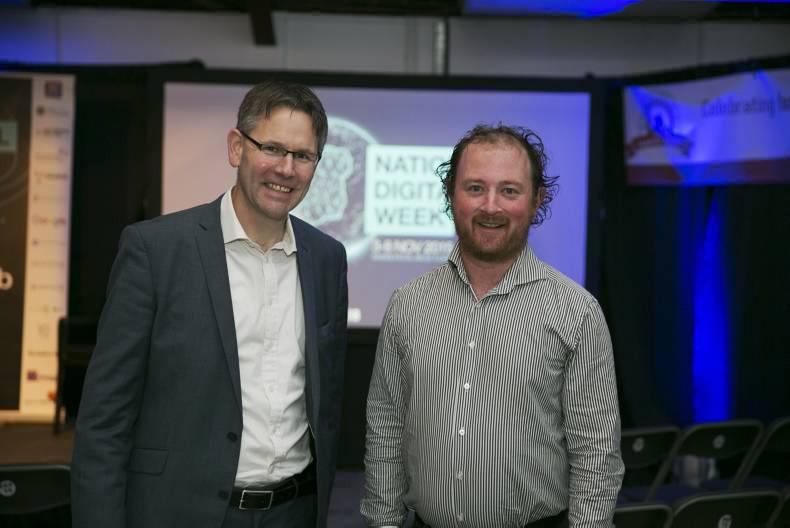We first had Food Harvest 2020 and then Farm Wise 2025, but the organisers of National Digital week in west Cork set out to look even further ahead. Farming 2030 asked all involved in farming to consider innovation and technology in agriculture.
It looked at many of the developing technologies and encouraged entrepreneurs to create companies and jobs in rural Ireland. The overall aim of Farming 2030 was to promote the Ludgate@Skibbereen initiative, which aims to create a model for sustainable rural economies where people have the opportunity to work and live in beautiful, non-urban areas where every place will have digital connectivity.
Oliver Farrell, one of the organisers, said: “Hosting our event in the inspiring rural location that is west Cork, we demonstrated what is possible in Rural Ireland. Most importantly, the unveiling of a 1GB connection to the Ludgate Digital Hub and the announcement of 20 new jobs at local Skibbereen-based technology company Spearline Labs.
If farmers want an example of how big data is being used for their benefit, they just have to look to the ICBF. Sean Coughlan, CEO of ICBF, told the story in Skibbereen.
Based in a disused bull shed in Bandon, the ICBF has combined old agricultural facilities with state of the art technology to become a world leader in data collection and use. It is ahead of other similar organisations around the world. This didn’t happen by chance. Ireland is well-positioned structurally and the key is collaborating with Teagasc, AHI, AI and milk-recording companies, various co-ops and breed societies for farmers’ benefit. This is down to the close co-operation between organisations. “Awareness of importance of data to Irish farmers has changed since ICBF was founded. People see value in data now,” said Sean. The real challenge for ICBF is disseminating all the data into a simple format for farmers. “We need to ensure that the farmer benefits from data gathered on their farm,” said Sean. “All essential information needs to be on one page or at the very least one sheet of paper to make it workable at farm level.
There are really valuable data flows to chase that benefit farmers. “Nobody knew for sure the scale of the fertility problem in Ireland until we had the data to show it. Once we knew it was an issue we could go about fixing it. We can now put ourselves in a position to use breeding to help deal with longer-term animal health issues on Irish farms.”
For example, collaborating with AHI and the meat processors, ICBF is able to gather fluke data. This data can be of use at farm level, first of all on the day-to-day treatment of fluke but secondly as a means to predict what genetic lines may be more susceptible to fluke and other diseases.
Improving accuracy of the figures is an ongoing process and this will further help breeding decisions at farm level. The key is to try to tap into existing data sources, without having to get the farmer to do any extra work. For example, the availability of animal weights from marts and factories has been key to developing good animal growth and carcase traits. “If we were to depend solely on on-farm weighing, we would have minimal data available on cattle weights. Thankfully, the cattle marts and meat processors came on board providing a solid foundation to the genetic evaluations,” said Sean.
The ICBF also facilitates the integration of data from companies who offer on-farm recording software services, which helps to reduce duplicate data input by farmers. “If data is captured once, it shouldn’t have to be recorded again,” Sean stressed.
There are still areas to work on, especially in relation to international standards for data and data recording. For example, data captured by different milking machine manufacturers in their proprietary software is not easily comparable across platforms. This limits the potential value of the data to the individual farmer and to the wider industry. ICBF is working through ICAR, the international body, to standardise measurements.
“The benefit of information technology is wider than farmers but also benefits rural areas. It gives those who want to stay involved in agriculture and remain located in rural Ireland excellent opportunities. It has the potential to help rural Ireland remain alive as those seeking work in the technology sector have options other than to be drawn towards Ireland’s larger urban centres,” said Sean.
Nimbus
At the conference Brian Cahill said The Nimbus Centre in Cork Institute of Technology is one of 39 knowledge providers or technology gateways, which are essentially third level institutes capable of developing prototypes and services. Established in 2006, Nimbus has an extensive research offering which has delivered consistently to energy research in particular. It is credited with expertise in embedded platforms for building IoT applications, touch-sensitive materials, wireless tracking, digital media management, healthcare systems development, indoor navigation systems, and wireless analysed energy monitoring systems. In addition, Nimbus offers industry and academia a variety of testbeds such as its energy testbed based in CIT, water testbed using key water assets in Co Cork, and its urban and rural community testbed in Mallow.





SHARING OPTIONS